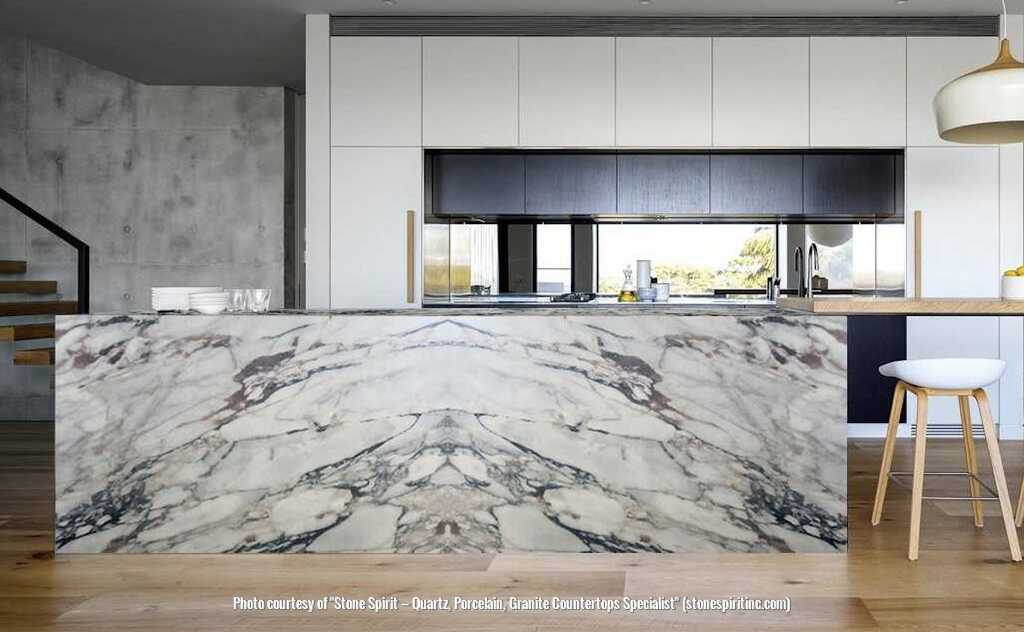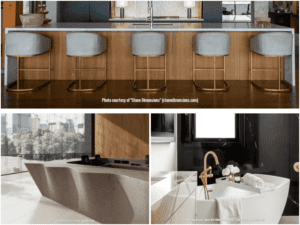How to choose a kitchen countertop: honestly about the strengths and weaknesses of natural and artificial stones
As a rule, a countertop is the last part bought and installed during a kitchen set installation. By this time, a homeowner usually has a bit less spirit and desire to compare different rocks and delve into their specific features. This is even more the case when you come across the bulk of conflicting info on the subject on the web and how much time you are to spend to establish the truth!
Wishing to save your time, we’ve decided to analyze all the information on the subject of countertop production in the country. We’ve not only singled out the best providers, but also interviewed an expert, a seasoned countertop installer from Charleston with more than 10 years’ experience.
This has helped to weed out all the dubious claims found on the Web and let to operate with only verified data. Keep reading, and you will find out about the real merits and demerits of countertop materials. We’ve aimed to give you the most honest tried-and-true facts, so this article alone will be enough for understanding the specifics of each type of rock and choosing the one that would suit your requirements.
What an ideal countertop should be like?
A kitchen countertop is not just a surface, but a working surface. This worktop toils hard every day, like a Trojan, going through mechanical, thermal, and chemical influences. No doubt, you are familiar with the following situations:
- you happened to put a hot pan onto your countertop – just to make room on the stove for further cooking…
- your son has rushed to get some juice and spilled it on the surface…
- your husband made a sandwich without using any cutting board…
- your daughter rinsed a cup in a rush and left it on the top…
- your cat was jumping on the tables all night long and smashed everything in its path…
All this makes you clean your tops from ceramic chips and soil, scrape off the dried food remnants, rub out water stains, and polish scratches. That keeps on going day after day, making your poor countertop go through the real Groundhog Day. To overcome these hardships with dignity and maintain presentable looks for years, your tops have to be made of truly strong and sustainable materials.
According to our wishes — which are, if fact, the wishes of all the homeowners in the world — the ideal countertop should be:
- resistant to strikes, butts, and chips;
- on-absorbent and non-staining;
- heat- and water-resistant;
- standing up to acids and other aggressive substances;
- easily cleaned and restored;
- naturally blended into any kitchen space;
- affordably-priced.
Anyway, no material in the world is able to answer all these requirements. But mother-nature has created amazing natural rocks that satisfy the bulk of our strongest desires. Not only are they firm, inviolable, and reliable, they are also diverse and strikingly beautiful. Their uniqueness was understood a lifetime ago, and this vital factor keeps on influencing our choices.
Natural stones
Agree that it is such a pleasure to have a kitchen with a natural stone design! Marble, granite, and other rocks are not only practical and decorative; they bring more life into a space, fill you with energy and give you the feeling of comfort and peace. It’s hard to find another material able to compete with the physical and aesthetic properties of natural stones. Palettes of their shades fascinate us in their wide diversity. Coming to us from the earth’s depths, their beige, brown, bluish and greenish tones daze us with patterns of their veins, shapes, and curves.
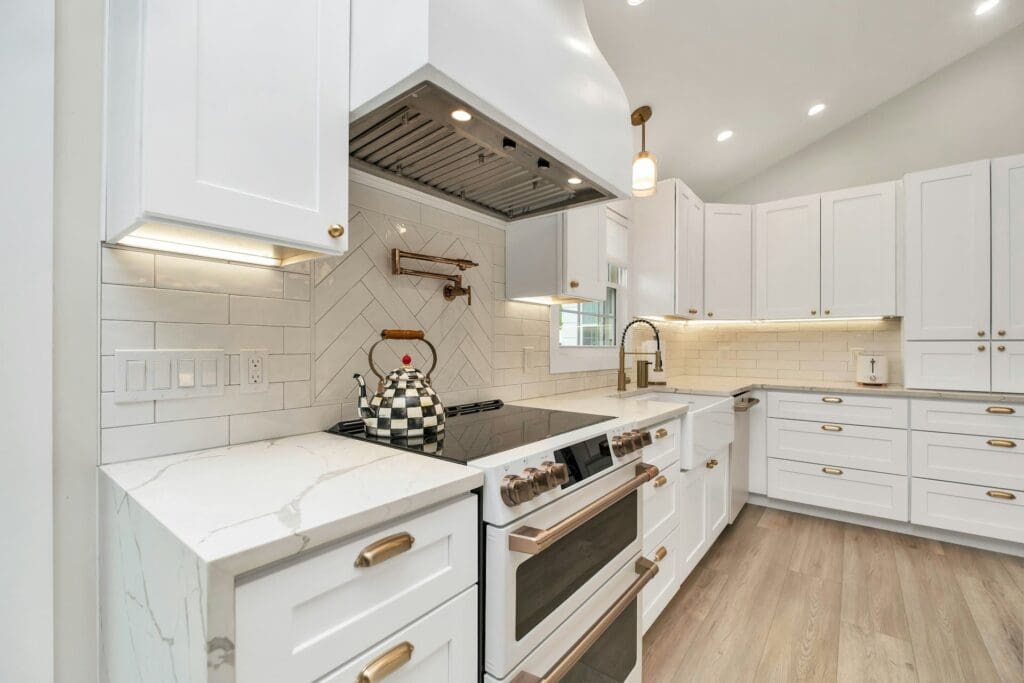
Let's take a look at the types of natural stone that are most often used by North American countertop manufacturers. You’ll know about their major strengths and weaknesses and see our tips on how to choose rocks for your tops properly.
Granite
Of all the stones used in countertop production, granite is the strongest and the most durable one. The unparalleled strength and durability of granite countertops, their diversity and opulence are admired by many. And if you also install a granite backsplash, you’ll become a happy owner of one of the most beautiful kitchens in your neighborhood.
As great as it is, granite is not without its flaws. Firstly, this is not an easy task to tool such a stone, which inevitably affects the price of granite products. It is also worth knowing that it is a porous rock, and, in order to strengthen its resistance to moisture, once a year it should be treated with special agents. Secondly, some kinds of granite may have a heightened radiation background. Make sure to ask your provider for the certificate, which would indicate the granite type and its radionuclide level.
Advantages:
- fracture strength;
- durability;
- high temperature resistance.
Disadvantages:
- needs to be matched with the rest of the interior;
- pricy;
- may have a higher background radiation.
A couple of tips from COCO:
- work in contrast: choose a dark granite countertop to match the light kitchen set, and the other way round. This luxurious material should stand out from the rest of the kitchen;
- the finely polished granite countertop looks better with solid and a bit diffused lighting.
Marble
Nature has used its highest art to create a rich palette of marble shades, beginning with white and pink, and ending with brown and even black. Each marble surface is unique, and there are not two identical marble slabs, both in color and in texture. If the marble surface is carefully looked after, it will serve you for ages. But note that this stone is not too resistant to liquids: spilled wine, tea, coffee, or juices quickly penetrate into its pores, and the stains are pretty difficult to remove.
One more important factor is that marble is a powerful antiseptic that kills pathogenic bacteria and microorganisms. So, in terms of hygiene, it is a great benefit.
Pros:
- luxurious appearance;
- long life duration;
- hygienic.
Cons:
- expensive;
- increased porosity (and a risk of staining);
- exposure to thermal gradient (prone to darkening from heat).
A tip from COCO:
- the so-called Liquid Glass is an excellent solution for sealing the pores in marble. Use it every 8 months, and your countertops will be much less affected by the mug marks, stubborn stains, and scratches.
If you decide to choose marble countertops, use our prompt and convenient search service:
The results can be filtered by several criteria, including the material (marble, granite, etc.) and the area you live in.
Soapstone
Soapstone is a natural material with a silky smooth surface, mostly gray or dark-gray in color. Previously, it was often used in the decoration of farmhouses and their kitchens. The combination of white cabinets and stained wood with soapstone used to work greatly and created an admirable effect.
Today, soapstone is used mostly by those who wish to give their countertops an antique touch. The surface of a coal-gray shade slowly transforms: over time it gradually oxidizes, darkens, and gets covered with spectacular, «soapy» stains, reminiscent of an antique patina. This is the only thing that connects soapstone with soap as we know it. In fact, the stone is rather firm, heat, water and stain resistant. But that hardly means that you can break bad and cut onions with no chopping board!
Advantages:
- heat-resistant;
- non-easily smeared;
- does not need sealing;
- affordably priced.
Disadvantages:
- easily darkens;
- prone to cracking and chipping.
As already mentioned, the last “negative” point can also be the soapstone benefit – for the rock’s ability to stylize your kitchen design under the “old days”. All these facets and scratches obtained in the course of time will make it look like antique artwork!
A tip from COCO:
- soapstone, in contrast to marble and granite, has no pores, and so there is no need for any solutions like Liquid Glass. But if you want your countertops to be less prone to scratching, treat them with a special mineral oil from time to time.
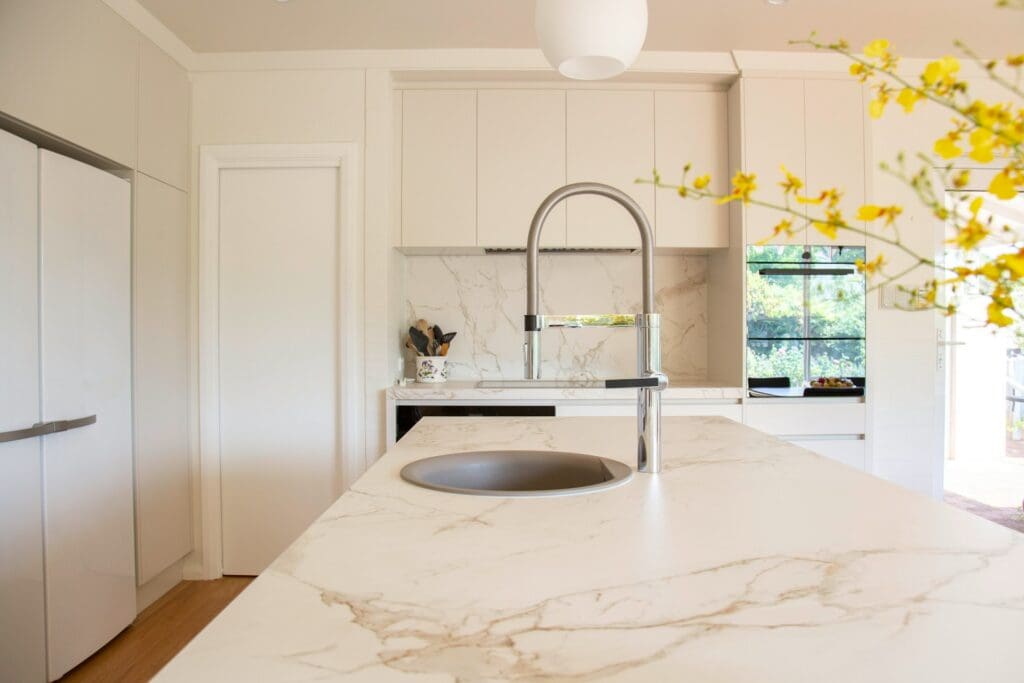
Slate
Slate is unpretentious in care and practical in usage. Similarly to soapstone, slate is also a layered rather than porous rock, and, therefore, resistant to staining. It is also a heatproof, which is very handy for those who tend to go without cooking stands
This black stone covered with thin gray veins has a really fascinating appearance. Apart from black, there are also other shades of slate: brown, blue, green, and even pink. Thanks to this, everyone is able to choose the right countertop color that would match the rest of the kitchen.
Pros:
- heat-resistant;
- impervious;
- relatively inexpensive.
Cons:
- low resistance to chips and scratches.
A tip from COCO:
- minor scuffs and marks, however, can be easily removed. Just slightly rub the damaged area with soft sandpaper, and the original velvety appearance will be returned.
Quartzite
Natural quartzite (as opposed to artificial quartz agglomerate, which will be discussed later) is a firm rock with a marvellous structure. Outwardly, the stone resembles marble, but is relatively harder and denser. A distinctive feature of quartzite is the multiple inclusions of stripes and lenses formed during the stone re-crystallization. The resulting pattern gives a stunning optical effect that is widely used by furniture and interior designers.
Quartzite surfaces are much harder than granite ones. They are super-firm and very difficult to damage. Moreover, the material has a high resistance to heat, and you’ll never have a problem with placing hot pots and pans directly on the top.
Advantages:
- high-temperature-resistant;
- super-strong and durable;
- elegant and visually alluring.
Disadvantages:
- quite expensive. Due to the hardness of quartzite, countertops can be made only with special diamond cutters. This is a laborious and time-consuming process.
A tip from COCO:
The presence of pores, which diameter, however, is a bit smaller than one in granite or marble. To make the surface last longer, wipe up dirt and spilled liquids immediately, before they’ve had time to soak in.
If quartzite has impressed your heart, use our search engine, filter it by material:
And it will show you 10 proven companies specializing in manufacturing and installing quartzite countertops in your town.
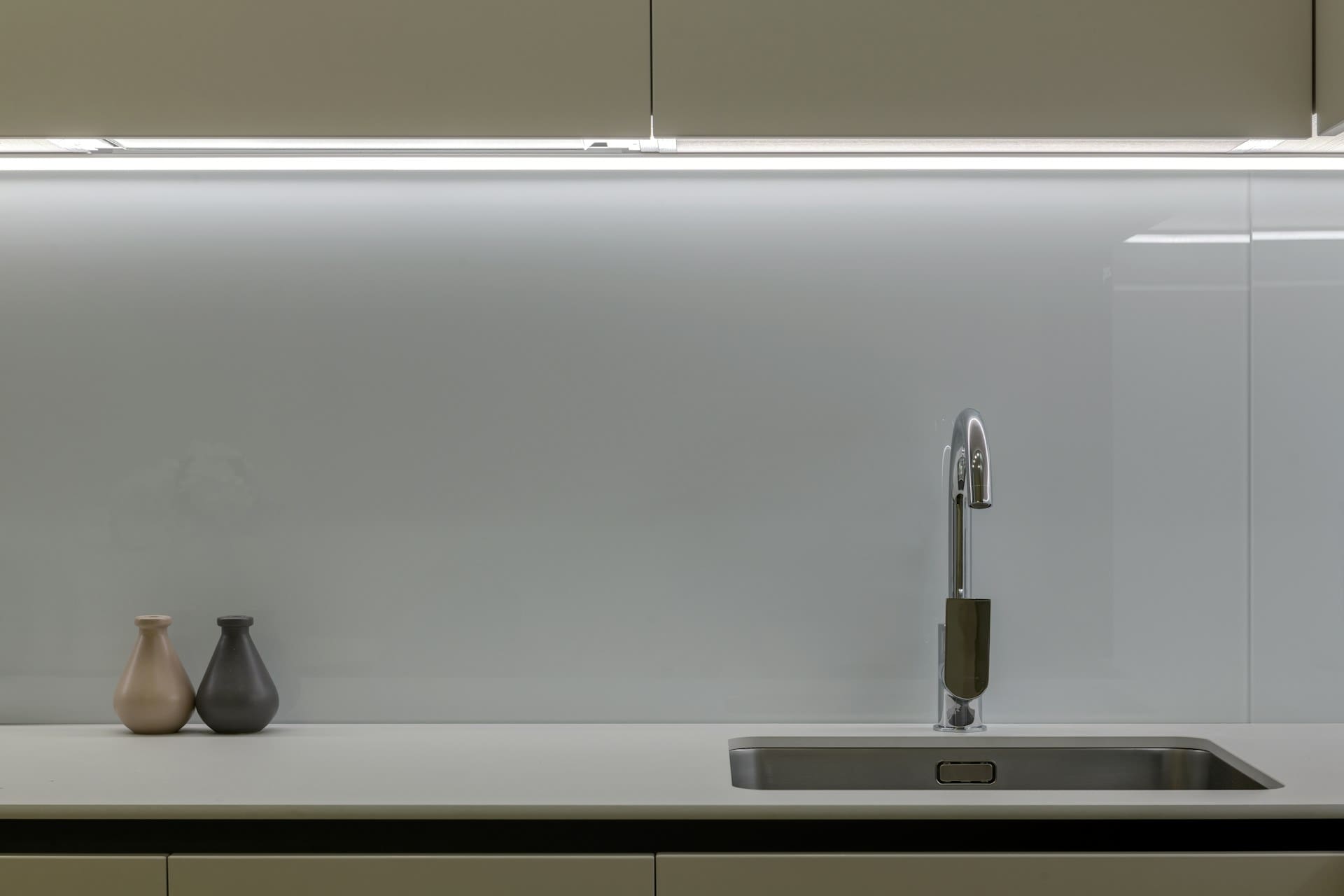
Dolomite
After dolomite is mined from the earth, it is shaped and polished, and after this comes out something very special. Finished dolomite surfaces are aesthetic and functional, and simultaneously similar to both marble and granite. The dolomite durability is a cross between these two materials. Despite the fact that dolomite countertops might be scratched with a very sharp knife or glass, you are to try really hard to get to this point.
Dolomite is indifferent to high temperatures, and so hot pans and pots are not a problem for this splendid stone.
Pros:
- looks like marble, but less expensive;
- resistible to heat;
- high service life;
- easy to care for.
Cons:
- might be get coloured and stained;
- sensitive to abrasives and harsh chemicals.
A couple of tips from COCO:
- like all natural stones, dolomite requires regular treatment with protective fluids that seal its pores;
- dolomite countertops are quite heavy and require a solid base (which, in fact, is not too different from other natural stones’ requirements).
Travertine
This charming stone is a real finding for all those who want their kitchen to be unique and different. The alternation of cavities intertwining into a bizarre web, makes the travertine surfaces look like a real work of art that’s miraculously survived from ancient times.
Because the natural pattern of travertine is similar to the texture of wood, countertops made of it look great in a wooden kitchen. In order to preserve the pristine beauty of the rock, it should be cared for with special water-repellent agents. The protectants will clog pores and prevent liquid from penetrating into the surface. That should be done every 6 months - if the kitchen tops are used every day. And keep in mind that travertine is not too resistant to high temperatures, so cooking stands shouldn’t be ignored!
Advantages:
- has a luxurious warm color;
- inexpensive;
- easily restored.
Disadvantages:
- vulnerable to acids;
- doesn’t withstand high temperatures;
- needs special nurturing.
A tip from COCO:
- travertine contains calcite, the stuff that is very sensitive to acids. Liquids such as wine, lemon, juices, and vinegar can easily destroy surfaces made of this rock. But if you, despite these small shortcomings, are still fascinated with the material, don’t hesitate to install it in your kitchen. And if you are afraid of spills, limit it to the bathroom.
Artificial stones
The two most popular artificial stones offered by nearly every American countertop company are:
- quartz
- porcelain.
Let's take a closer look at the strengths and weaknesses of surfaces made from the above materials.
Quartz
On the websites of some manufacturers, quartz is found under the name “quartz agglomerate”. This is because the material comprises not only the quartz itself, but also a binder (most often, polyester resin) and color pigments.
The combination of natural and artificial textures allowed the material to take the best from both of them. The smooth monolithic surface is devoid of pores, does not react to liquids, chemicals, and bacteria, and is not prone to forming mold.
Quartz is one of the hardest stones, and countertops made of it are super-durable and non-scratchable. They withstand everything, up to the chopping of meat, chicken, or fish. But due to the presence of polymer resins in its composition, placing hot dishes on the quartz surface should be avoided.
Pros:
- spectacular appearance;
- environmental friendliness;
- heat- and moisture resistance;
- mechanical strength.
Cons:
- more expensive than natural stone;
- difficult to restore.
A couple of tips from COCO:
- due to their massiveness, quartz countertops need solid and expensive basis;
- the wall-adjacent welt of the quartz countertop should also be made of the same material. If you prefer, the welt can be replaced with a quartz apron that helps to create a harmonious and complete ensemble.
Has this wonderful stone caught your fancy and made you want it in your house? Filter your search by “quartz” in our website’s search engine:
And you'll get 10 best companies that specialize in installing quartz countertops in your town.
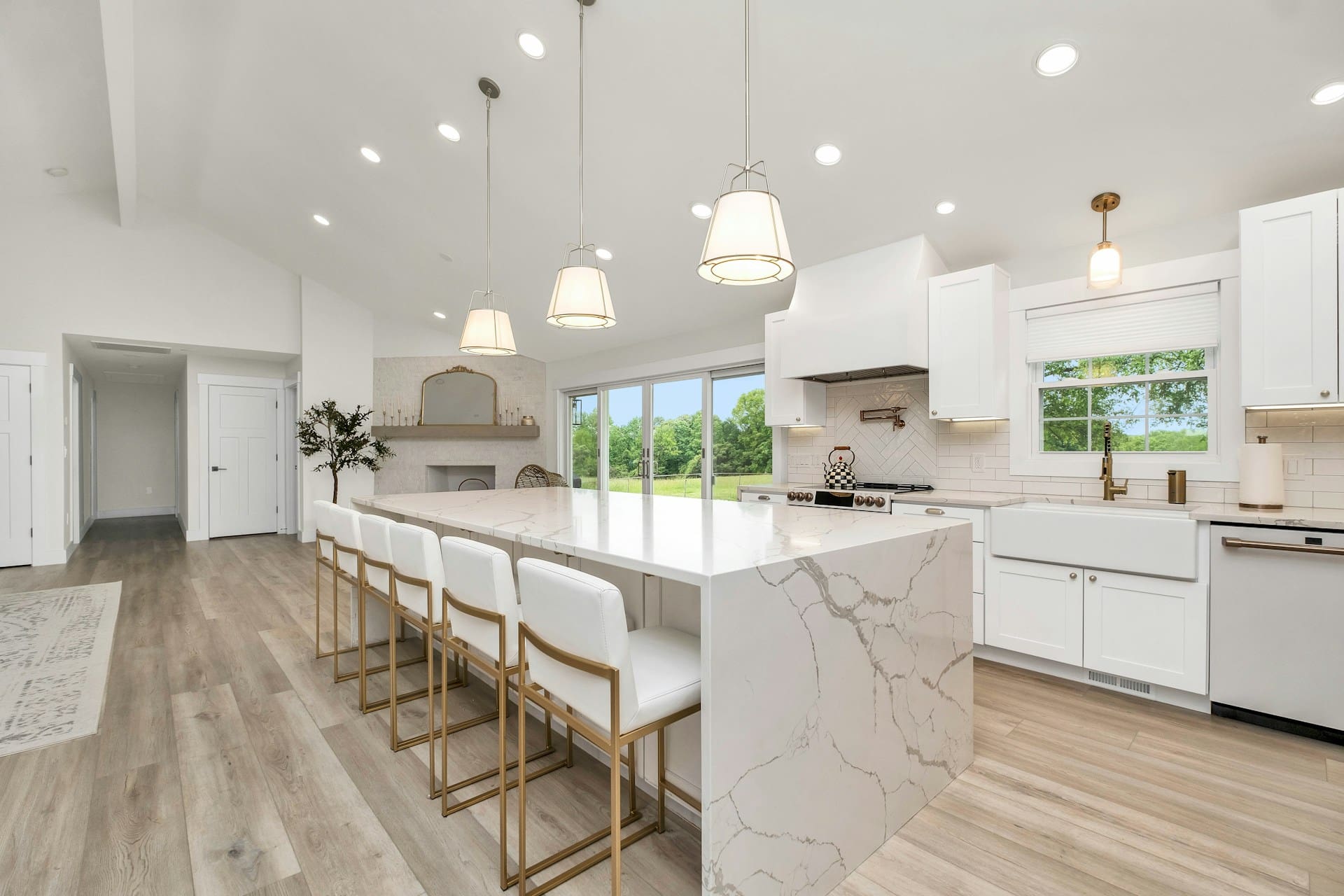
Porcelain
Porcelain is made from clay, but not from any clay. The kind that is used to make countertops is often referred to as Chinese clay, which is rich in a mineral known as kaolin. In company with silica, feldspar, and other mineral oxides, kaolin is responsible for the strength and durability of the resulting porcelain.
Burned in a kiln at very high temperatures, the material becomes resistant to scratches, stains, and hot bottoms of pans. And the pigmented glaze added during the production makes the porcelain surfaces mimic the colors of natural stones and remind the veins found in marble.
Advantages:
- immune to domestic chemicals, moisture, and heat;
- environmentally friendly.
Disadvantages:
- prone to form shears;
- labour-intensive production (cutting porcelain slabs, for example, requires special equipment).
A tip from COCO:
- although the porcelain countertop is scratch-resistant, a ceramic knife might be the only thing that can damage it, and so this kind of knives should be avoided.
A few last tips
As the review showed, material that would fully agree with the idea of a perfect surface with no flaws has not yet been invented, either by nature or by man.
But we believe that we've selected the best solutions to help you find the stone that would suit your kitchen requirements.
To find out which companies in your area specialize in the production of countertops from the described above materials, enter your zip-code in the appropriate search field. The resulting webpage will return 10 top companies that we've selected by the most important criteria from dozens of others.
And finally, a few recommendations from COCO that might also assist you:
| ! Matte countertops, regardless of the material, are more practical than glossy ones. That's confirmed by numerous reviews located on thematic websites and forums. But, ultimately, it’s up to you and your family to decide. | ! Before making an order, visit a show-room of the countertop provider to see and touch surfaces made from the material of your choice. No photo or video — regardless of how high the resolution might be — can truly give you the true-life sense and feel of the rock. “Meeting in the flesh” is the best way to understand what is what. | ! Make sure to be around during the countertop installation — to check the tightness of the tops’ fit to the base and walls, and make sure that all parts are correctly installed. Real masters of their craft won't pay attention to your presence, and you'll be ensured that the work is done properly. |



